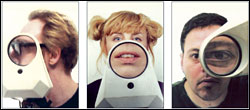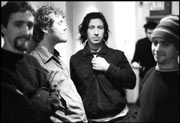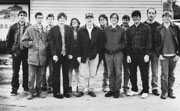For years now, the running story on Bettie Serveert was that they weren’t the same band they were in 1992. To understand this charge, you’d have to grasp where the Dutch pop group was 10 years ago, what was being said about them, andmore than anything else what was being expected of them.
When Palomine, the group’s ragged, winning debut, was released on Matador Records in 1992, the label was already white hot with hype. Pavement’s Slanted and Enchanted had been issued the same year, making huge waves in the kiddie pool of indie rock, and buzz was already beginning for a whip-smart Chicagoan named Liz Phair. It was natural that the Betties would reap some benefit from the attention, but the press reaction to Palomine‘s tangled guitars and honeyed melodies was astounding, nearly equal to the mammoth adulation accorded to Slanted.
Stories in Rolling Stone and Billboard breathlessly compared the group to Crazy Horse, and a New York Times appraisal of their live performance likened lead vocalist Carol Van Dyk’s searching voice to Chrissie Hynde and Lucinda Williams. Their shows quickly became full-scale industry fetes, packed to bursting with salivating journalists and dollar-eyed A&R people. Given that Matador had just entered a distribution deal with brawny major Capitol, the group’s radio-ready songs and Van Dyk’s little-girl good looks made them a natural choice for colossal success.
“It was a roller coaster,” admits guitarist Peter Visser, who is in transit to New York, where the band will begin a tour in support of its fifth album, Log 22. “We were totally flabbergasted. We had no experience whatsoever with that kind of interest. It was nerve-racking, because we didn’t know how to respond at all.”
They ended up choosing the response currently favored by current causes c鬨bre Interpol and the Soundtrack of Our Lives: They turned their lives into a never-ending tour. The group played shows throughout 1993, each blistering gig raising the bar a bit higher so that when it came time to follow up Palomine, Bettie Serveert found themselves spooked by their own gigantic shadow.
“We were touring and touring and touring, and then suddenly we had to make a new album, and it had to top the first one,” Visser sighs. “It was hard to figure out what direction to go.” The group entered the studio with three half-finished songs, forcing Van Dyk to write lyrics as new tracks were being written and recorded. “We put a lot of pressure on our shoulders,” Visser admits. “We thought, ‘We made so many people happy with the first album, we’d better not fuck it up with the second one.’ It became kind of weird.”
The resulting record, Lamprey, instantly burst the bubble of goodwill that had enveloped the band. Wan and confused, the record bore the earmarks of a band suddenly unsure of its creative footing. Though they tried to refocus with 1997’s Dust Bunnies, it, too, failed to meet expectations.
“We had this contract with big numbers in it, and Matador came to us and said, ‘We can no longer afford it, because if we have to come up with these kind of numbers, then you have to sell at least a million copies.’ We understood that this was ridiculous, and we said, ‘We can lower that amount of money and be happy with a lot less.’ But they had made their minds up already,” recalls Visser. “The decision was made before we ever got to talk with them about it, and that was sad.”
It’s hard not to read Bettie Serveert’s story as a cautionary tale, especially in a time when industry wonks are so desperate to revive consumer enthusiasm for rock ‘n’ roll that they are hailing new messiahs with each turn of the calendar page. But where other acts implode from the pressure (Radish, anyone?), Bettie Serveert stepped back and regrouped. They returned to Holland, founded their own label, and, after a three-year silence, released Private Suit, roundly acclaimed as the best record of their career. Where previous efforts had sounded forced and desperate, Private Suit was relaxed, graceful, and hauntingly sparemuch of that due to the steady hand of producer John Parish (PJ Harvey, Eels).
“We had all these different-sounding songs,” recalls Visser, “and he had to figure out a way of mixing that glued them all together.”
While the just-released Log 22 (named for a series of journals kept by Van Dyk) is not as consistent as its predecessor, it is far more adventurous. Where the group’s last few records have roamed lazily within certain melodic fences, Log 22 displays a greater stubbornness against being contained. “Smack” starts and stops and starts again, Van Dyk whistling the intro with Jeroen Blankert’s percussion stammering behind her; on the title track, Visser unsheathes a fiery, furious lead and uses it to slice straight across the song’s melancholy melody. Where Private Suit saved its restlessness for the lyrics, the new record sews it right into the seams.
“You usually start recording with drums and bass guitar, and then you add the guitar and vocals,” Visser explains. “That’s what always happened in the studio. I always wanted to add some instrumentation to itkeyboards, loops, samplesbut never had time to. Every time the drums and bass were on tape and I came up and said, ‘Can I try the synth now?’ it was, ‘No, we’ve got to move on, we’ve got to do another song.’ So this time, I bought a 16-track Hard Disc recorder, and Carol and I started recording just vocals and acoustic guitar.” When Van Dyk departed for Antwerp to record the second record with her country side project, Chitlin’ Fooks, Visser began fiddling with the skeletons they had assembled. “And then I would go over the top in that genre as much as possible,” he says.
Nowhere are the results more awe-inspiring than in the glass-fragile ballad “Captain of Maybe.” In four minutes that rival all the naked longing of Palomine, Van Dyk lays plain all of her fears and doubts and disappointments. It’s a passage as packed with regret as the end of All My Sons, and with standard production it could have been a maudlin, self-important mess. But Visser keenly loads the backing tracks with synthesizers, supplanting the guitar as lead instrument and serving as a whistling mechanized counterpoint to Van Dyk’s dangerous humanity. It’s a stunning moment, one of many that indicate that Bettie Serveert are just nowa decade after debutingfinding their feet, and figuring out how to upend expectations.
“I cannot come up with another thing that is more fun to do for a long time than to be on the road and meet a lot of people and make songs,” says Visser. “The adrenaline, the nervesthe whole package is a wonderful thing.”
Bettie Serveert’s wonderful thing has survived both hype and its sobering aftermath. They emerged from a pair of mediocre efforts and crafted two back-to-back albums that speak to both their talent and their willingness, when all else fails, to shred the rule book and run the whole enterprise on nothing more than sheer guts and unpolluted love. And so in the end, the rumor mill is entirely accurate. Bettie Serveert are not the same band they were in 1992. They are, in fact, a much, much better one.






